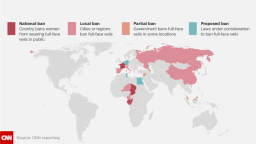The Netherlands on Tuesday became the latest European country to introduce a ban on face-covering veils in some public spaces.
The Dutch Upper House of Parliament passed a law banning face coverings, including burqas and niqabs, in public spaces such as schools, hospitals, public transport and government buildings.
However, it does not apply to public streets.
The new ban applies to all face-covering clothing, such as motor helmets and ski masks. But it does not include headscarves, as the face is still visible.

A niqab is a head and face covering, which has an opening so the wearer’s eyes are visible. A burqa is similar, but also features a mesh covering over the eyes.
The new law was passed by 40 votes to 35, Upper House press officer Gert Riphagen told CNN.
He estimated there were between 200 and 400 burqa or niqab-wearing people in the Netherlands, out of a population of roughly 17 million.
Proponents of the law say it will improve safety by making people more easily identifiable. Far-right Freedom Party politician Geert Wilders, who has campaigned heavily for the ban, was quick to praise the decision.
“Finally, 13 years after a majority in the Dutch Parliament voted in favor of my motion to ban the burqa, it became law yesterday!” he said in a tweet, along with the hashtags #stopislam #deislamize #freedom
Critics, such as Annelies Moors, professor of Anthropology and Sociology at the University of Amsterdam, warn it could dissuade some women from entering public spaces, including schools.
The law follows similar bans in France, Germany, Belgium and Switzerland.
In 2016, Cannes, a city on the French Riviera famous for its annual film festival, even went as far as to temporarily ban religious swimwear – including burkinis – in the wake of recent terror attacks in the country.
The bans were later overturned in court.
